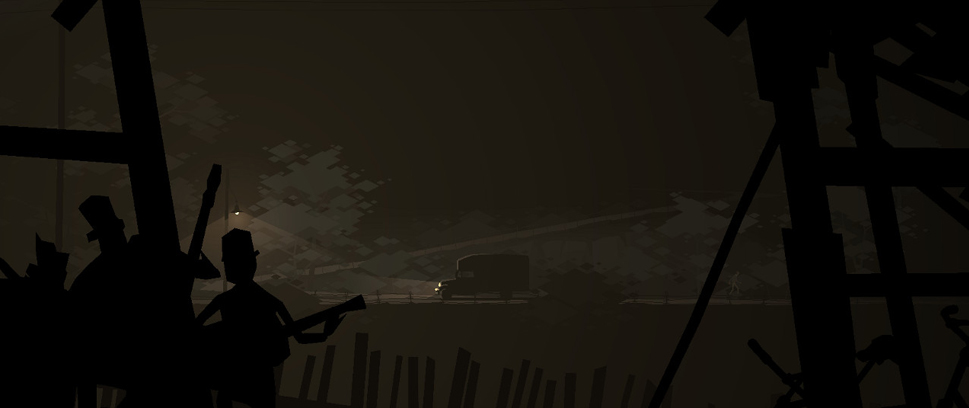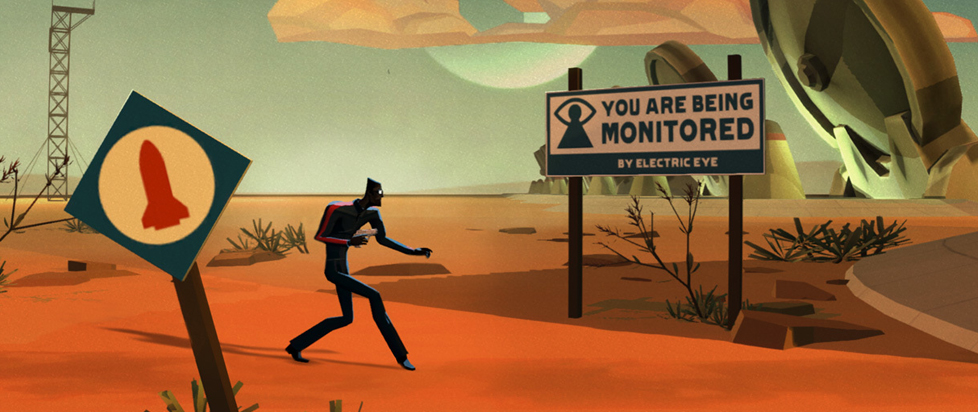
Bluegrass and Atmospherics
Editor’s Note: This story has been reprinted from Unwinnable Weekly Issue Fifteen. Want to check it out in all its wonderfully-laid-out glory? Pick up this issue or subscribe today!
———
Kentucky Route Zero’s composer Ben Babbitt is a musician’s musician. His father is a member of the Lyric Opera Orchestra in Chicago and his mother is a professional cellist. He’s quick to stress the collaborative nature of the game’s sound design, a work-a-day artist’s humility he maintains throughout our interview. We talked about how creating Kentucky Route Zero’s music is changing as the project evolves, his friendship with his Cardboard Computer cohorts Jake Elliott and Tamas Kemenczy and the ambitious song at the heart of the game’s third act installment.
———
UNWINNABLE: How did you first get started in music?
Ben Babbitt: My parents are both musicians so music was around the house quite a lot. They’re from the classical music world, where you traditionally start your children out on string or piano lessons quite early. I played a few instruments as a kid but nothing really stuck until I started playing the guitar and began writing my own music. I ended up studying composition early on in college before switching schools, although I still focused on sound throughout.
UNWINNABLE: How did you meet the other members of Cardboard Computer? In an interview with Rock Paper Shotgun, Jake Elliott mentioned that he went to school with you. Did you all meet at the School of the Art Institute of Chicago?
B.B.: Jake and I met in a class at the School of the Art Institute a few years ago. Jake had already been working with Tamas for a number of years and I met him after Jake asked me to work on KRZ.
UNWINNABLE: Do you do any of the broader sound design and foley artistry for the game?
B.B.: I do work on the sound design and foley for the game, yes. When Jake approached me about working on KRZ, it was only about contributing actual music to the project. But in the last year and a half, starting just after the release of Act I, there has been more and more collaboration. One aspect of that increasingly collaborative dynamic is that I’ve been doing the sound design and foley, although Jake and Tamas still contribute to that and help shape it in the way they implement sounds in the game.
UNWINNABLE: What’s the collaborative creative process like? Jake and Tamas are from the interactive art scene and the theatre scene, you’re from independent music. So, how does that work?
B.B.: It’s really just a lot of back and forth, a lot of long email chains. We get together in person to flesh out ideas. Usually the narrative and visual content gets to a certain point of completion before I really delve into working on the sound. Jake and Tamas will send builds of scenes that I can play around in. So far, the sound has come later in the process of making KRZ.
We all have areas that we contribute to, but they’ve been generous in terms of letting me be a part of that beyond just making music. We all kind of participate and are open to feedback and criticism from one another.
UNWINNABLE: With all the friends and connections you have playing in so many bands, how did you decide who you would grab off the bench and slot into working on Kentucky Route Zero?
B.B.: All of that stuff happened a couple years ago when Jake first asked me to work on the game. At the time, my contribution was going to consist primarily of the recordings of the band and a few ambient pieces. I was in a project with Emily Cross at the time and thought her voice would work well in that context. My roommate/friend/collaborator Bob Buckstaff is a really great bass player and had been playing a lot of upright bass around the house, so it It seemed like a good idea to bring him into the fold as well.
At first, I planned to multi-track all the parts but we realized it should be a bit more about the band and the live performance. At the time, we were really interested in recording it all to tape, kind of roughly. It was a loose attempt at recreating the atmosphere of the original Monroe recordings. We didn’t want it to be in this isolated, controlled environment like the synth world. It was really just a few haphazardly-placed mics in the basement with a tape machine that belonged to a friend of mine..
UNWINNABLE: Bill Monroe, infamously, played those bluegrass songs on the mandolin, but you’re listed on the liner notes as playing banjo. Did you have to do some transposing or how did that sound differ from the banjo?
B.B.: The foundation of our versions of those songs was Emily and I singing and me playing guitar. Then I overdubbed banjo as a kind of imitation of the mandolin in the Bill Monroe versions. I think that music lends itself really well to different instrumental arrangements, as long as the melody and lyrics are intact.
UNWINNABLE: Let’s talk about “The Bureau of Reclaimed Spaces.” It’s the one the “hobo organist” plays on the balcony.
B.B.: Oh, you found that?
UNWINNABLE: Yeah, I did. That was a great moment. Your liner notes say it was recorded at Highland Park Presbyterian Church. How did you guys find out about that place to record?
B.B.: My parents did a concert there with the music director, who’s an organist. When we talked about doing the piece I thought that I’d like to find a real organ to record. I asked if they knew any place where I’d have access to one and it ended up being that church. We asked the music director there and he was very nice and welcoming. I don’t think he knew I was making videogame music in there, but he let me have access to the organ for a couple days. I spent a lot of time playing the organ alone in the chapel. It was so incredibly thrilling, to have access to an instrument like that.
UNWINNABLE: What was it like for you personally, recording all of these spiritual songs? It seems like a total departure from the stuff you’re usually playing.
B.B.: I don’t know, for whatever reason, maybe growing up in the Midwest, I have a certain kind of familiarity with that music. I think one of the reasons that music really caught on so much was that it’s built on very simple chord progressions and melodies and direct lyrics. It’s stuff that’s easy to learn. It’s based on really familiar patterns in music that are used and reused over and over across many genres.
As far as my experience of recording that stuff, it had a lot to do with exploring something familiar yet mostly unknown to me as a musician. That kind of religious folk music really isn’t what I normally align myself with, but it was fun to sort of become the characters in the band in order to make those recordings. I wasn’t familiar with those songs prior to that point. Jake and Tamas talked about the Monroe recordings and I listened to that them as the primary model for our versions of the songs.
UNWINNABLE: We have to talk about “Too Late to Love You.” It’s kind of a pivotal scene in Act III. It’s also kind of a turning point for your music in Kentucky Route Zero. Is that the first time your original lyrics have been in the game?
B.B.: No, Jake actually wrote those lyrics.
UWINNABLE: How did you get those vocals, there’s such a crazy range in the voice?
B.B.: Um, well…It’s Junebug.
UNWINNABLE: It’s the magic of Junebug?
B.B.: We don’t feel married to any one approach with this. Not all the characters have voices, audible voices I mean. The characters only have fully audible voices when they’re singing, if they ever do. Junebug does. So, Junebug has a voice when she sings. It’s an instance where it was a way to explore a certain kind of theatricality or playing a role, or acting, or becoming a character. Her voice is a character.
UNWINNABLE: G. Christopher Williams at Pop Matters has pointed out the strong similarities between the Lower Depths and the Bang Bang Bar of the David Lynch series Twin Peaks and between Junebug and Julee Cruise. Was Julee Cruise or the series an influence on “Too Late to Love You”?
B.B.: There are obvious similarities between the scene in the Lower Depths and the Julee Cruise scenes, but I think that there’s a difference between the music in that stuff and “Too Late To Love You”. The way Julee Cruise sings is very timid and soft and she doesn’t use any vibrato, whereas I think Junebug’s singing is more dynamic and more confident and forceful, with this really dramatic vibrato. We talked more about singers like Loretta Lynn and Dolly Parton as references for Junebug.
Where the Lynch reference makes sense to me is in the harmonies and in the sounds of the music, not necessarily in the singing. Angelo Badalamenti wrote all the music for the Julee Cruise stuff (as far as I know) and used particular synthesizer sounds and chord progressions that establish a really particular atmosphere that I think maybe influenced my decisions in making those things for “Too Late to Love You”.
UNWINNABLE: I’ll admit, I had to watch some Youtube videos to make sure the player’s choices actually changed the verses and the bridges of that song, because I didn’t really believe you folks had pulled that off at first. What were the challenges of writing a song that would structurally and thematically give the player that kind of choice?
B.B.: It was maybe more challenging for Jake, because he had to write nine verses of lyrics, and I don’t think Jake had really delved into lyric writing prior to doing this. I really just tried to compose a musical structure that I could pour those different verses into. I was interested in inserting musical moments that are different for each choice. There are some things that pop in with certain choices that don’t in others, but the overall music is pretty much the same for each variation. In that way, it didn’t seem like it made sense to have a radically different musical backdrop for each choice.
I think we were interested in this idea of having a certain amount of variation, choice and input ability available for the player, while keeping the tone relatively consistent. It was really just making subtle variations for each choice musically, recording it in these sections and then piecing it all together.
UNWINNABLE: Can you talk at all about what’s gonna happen in Act IV?
B.B.: I don’t know what’s gonna happen. We’re working on it now. There will be some new stuff in Act IV musically, for sure.
———
Follow Marshall on Twitter @MarshllSandoval.





